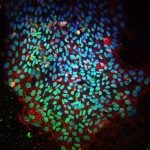Lien vers Pubmed [PMID] – 36544485
Lien vers HAL – hal-04149036
Lien DOI – 10.3389/fgene.2022.954713
Front Genet 2022 ; 13(): 954713
Though both genetic and lifestyle factors are known to influence cardiometabolic outcomes, less attention has been given to whether lifestyle exposures can alter the association between a genetic variant and these outcomes. The Cohorts for Heart and Aging Research in Genomic Epidemiology (CHARGE) Consortium’s Gene-Lifestyle Interactions Working Group has recently published investigations of genome-wide gene-environment interactions in large multi-ancestry meta-analyses with a focus on cigarette smoking and alcohol consumption as lifestyle factors and blood pressure and serum lipids as outcomes. Further description of the biological mechanisms underlying these statistical interactions would represent a significant advance in our understanding of gene-environment interactions, yet accessing and harmonizing individual-level genetic and ‘omics data is challenging. Here, we demonstrate the coordinated use of summary-level data for gene-lifestyle interaction associations on up to 600,000 individuals, differential methylation data, and gene expression data for the characterization and prioritization of loci for future follow-up analyses. Using this approach, we identify 48 genes for which there are multiple sources of functional support for the identified gene-lifestyle interaction. We also identified five genes for which differential expression was observed by the same lifestyle factor for which a gene-lifestyle interaction was found. For instance, in gene-lifestyle interaction analysis, the T allele of rs6490056 (ALDH2) was associated with higher systolic blood pressure, and a larger effect was observed in smokers compared to non-smokers. In gene expression studies, this allele is associated with decreased expression of ALDH2, which is part of a major oxidative pathway. Other results show increased expression of ALDH2 among smokers. Oxidative stress is known to contribute to worsening blood pressure. Together these data support the hypothesis that rs6490056 reduces expression of ALDH2, which raises oxidative stress, leading to an increase in blood pressure, with a stronger effect among smokers, in whom the burden of oxidative stress is greater. Other genes for which the aggregation of data types suggest a potential mechanism include: GCNT4×current smoking (HDL), PTPRZ1×ever-smoking (HDL), SYN2×current smoking (pulse pressure), and TMEM116×ever-smoking (mean arterial pressure). This work demonstrates the utility of careful curation of summary-level data from a variety of sources to prioritize gene-lifestyle interaction loci for follow-up analyses.


